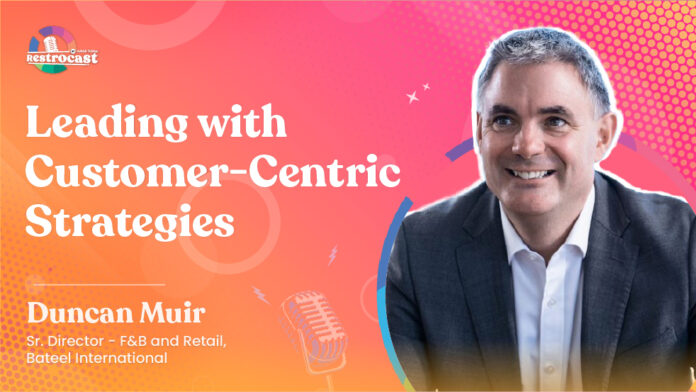Meet Duncan Muir, the senior director of F&B and Retail of Bateel International — a renowned Middle-Eastern brand known for its dates, café, and retail business. Muir has spearheaded the F&B operations of the brand, leading it to a decade of success.
Despite spending most of his life handling the F&B aspect of sports facilities, he didn’t let the challenges of building a retail business deter him. His successful career is the result of dedication, following a customer-centric approach, and communicating with the customers.
Muir went from being a law aspirant to a hotel management graduate, leading a food brand. What inspired this journey? And how did he keep himself going, considering restaurants weren’t a big trend then? Read along as we discover more about Muir’s journey of expanding Bateel, a retail business, into a customer-centric restaurant.
In Conversation with Duncan Muir, Bateel’s Senior Director, F&B and Retail
This episode on Restrocast with Duncan Muir, who we had a chance to speak with after the successful opening of the 20th Bateel store in Dubai. In this podcast, Muir talks about his journey from sports facilities to retail business.
He told us how following a customer-centric approach, listening to customers’ feedback, and diversifying, among other things, shaped his career. He also discusses the relationship between brands and aggregators.
Entering the F&B Industry
The story of how Duncan Nair entered the hospitality industry is unexpected, to say the least, considering that he was aspiring to be a lawyer.
Like any other teenager, Muir wanted to save money so he could buy a car. So he started working at a local hotel in the UK. He enjoyed it so much that he thought of making it a career.
“I like this. It’s social. It’s good fun. I love food, being surrounded by it, and getting to meet people and work with some great people. I thought, this is good,” Muir says.
From there, his focus shifted from a courtroom to a hotel. He studied hotel management at Strathclyde — one of the best universities in the UK. He then went on to do a graduate program at Hilton, only to realize restaurants excited him more than hotels.
“The hotels are fascinating places, but the restaurants are where the action is and where the passion for food is,” he said.
Yet for several years, he managed the F&B operations of various sports facilities such as Creek Golf and Yacht Club. “A lot of my experience has been in sporting facilities in the Middle East, but always in F&B, whether it’s food restaurants or food retail,” says Muir.
Now you might ask how the F&B of a sports facility’s F&B differs from a restaurant. According to Muir, you have a sitting population in a sports facility — people using the pool, playing golf, or simply enjoying. If you’re at a restaurant, however, you must create traffic.
Communication With Customers
Working in an independent restaurant is like working on a blank canvas. You have to be creative and extremely consumer-focused. You have to be resilient and resourceful to get the customers in and to react to situations.
This is why, at Café Bateel, Muir and his team change 40% of the wholesale menu every six months, and introduce a new dish every month. Muir says your loyal customer base enjoys this newness everytime they revisit your restaurant.
These changes are also communicated to the customers. Bateel’s marketing team sends out updates and its influencer community and social media makes sure everyone knows.
While it’s easy to lose focus in an industry as dynamic as the restaurant industry, your end goal should be to benefit the customer. They use the feedback system to keep their menu dynamic and customer-centric while maintaining the brand image.
“Whether it’s your marketing approach, your systems of operations or everyone should remain whatever you do, think of the customer’s perspective because, at the end of the day, we’re nothing without our customers,” he says.
From Retail To Café
Bateel is the only gourmet organic date producer and seller in the world. So imagine the ripple of surprise when it opened its first café in the United Arab Emirates in 2007. It has been so successful, though, that it has since spread to other nations.
So what drove Muir to diversify a well-known retail brand into the most prestigious restaurant franchise?
Well, it was the excitement of owning, developing, and operating the brand with greater accountability, he told us. Their excellent new product development (NPD) team helped them face the challenge head on — developing all their dishes and drinks. The brand has been consistently changing its menu every six months, even during COVID-19. Doing so has helped them engage customers and avoid menu fatigue.
Importance of Feedback
For restaurateurs, customer feedback is crucial. The restaurant’s goal is to give the customer a relaxing and enjoyable experience that will result in higher revenue.
“When you get multiple, multiple feedback of the same thing, then there’s obviously something very actionable there,” said Muir.
At Bateel’s, they follow a scientific approach to decision-making. They look at the sales mix trend, collect online and offline feedback, and analyze the performance of all operations. This feedback is then categorized into two forms. One is with all the feedback going around the internet about the restaurant. In contrast, the other is the traditional feedback filled with all the verbal feedback received from customers at the restaurant.
“We’ve tried with tablet-based systems, and that’s been fairly effective. But still, the conversation between the manager and a guest provides us with the most detailed, I think, feedback we can get,” he says.
Relationship Between Brands and Aggregators
Food aggregators act as mediators between clients and restaurants, providing access to customers to their favorite dishes online. Customers can place orders via their apps or website and get the food within minutes of ordering.
Aggregators have rapidly infiltrated the restaurant industry, significantly taking up a proportion of the restaurant’s revenues. According to Muir, the industry needs to value and respect them as a revenue channel because they drive business revenues at the end of the day.
That said, Muir also believes that there is a question about ethics in how they operate. “There is a huge problem with driver and road safety … unfortunately, the business model that the aggregators and the last-mile operators have is that they only pay the drivers per delivery. So what it does is it creates a culture of I need to get these deliveries done as quickly as possible … So they want to try and do as many deliveries as possible, which means they take more risks on the road and they drive quicker,” he says.
Duncan Muir is also the general manager of Foodmark Group. He is a member of DRG’s Advisory Board, supported by the Dubai Chamber of Commerce and has served as the senior business manager at Carluccio’s & Mango Tree and as F&B Services Manager @ Hilton London Metropole.
Muir believes that commercially driven people and people with business acumen should explore the restaurant industry before branching into other industries.

















